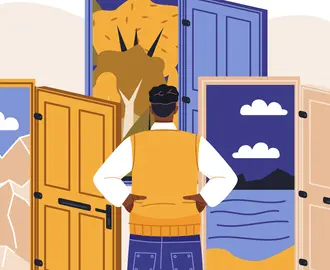Back on the MIT Sloan campus to take part in MIT Sloan Reunion 2022 events, alumnae founders Carla F. Avila, MBA ’97, Gabrielle A. Haddad, SF ’17, and Jaclyn Selby, EMBA ’21, engaged in a discussion with moderator Malia Lazu (Lecturer, Technological Innovation, Entrepreneurship, and Strategic Management; Founder, The Urban Labs).
Carla F. Avila, MBA '97
Several themes emerged during the “Integrating Impact Within the Journey” panel, including community, culture, and navigating the challenges and opportunities that come with being a woman entrepreneur.
“Being an entrepreneur now is probably the best thing that I've ever done,” said Avila, who founded Electa Capital Partners. The global firm raises capital for specialty fund managers and financial sponsors that capitalize on transformative sector trends. In her leadership of institutional sales and investor relations teams, Avila has helped raise nearly $9 billion in capital to date.
Attributing to her firm’s success, Avila stated, is the MIT Sloan alumni network. “Every time I travel, my first call is always an email or text to my MIT Sloan classmates. It's really a fantastic network. A lot of the deals that we source and the firms that we represent come from my classmates or other alumni.”
Gabrielle A. Haddad, SF ’17
For Haddad, founder of Sigma Ratings, Inc., shifting from a broader outlook to community-based impact has been instrumental. “I had the idea that impact had to be this grand, global, massive thing in order for it to really be meaningful. What I've learned over the last five years is that actually where my impact feels the most meaningful is in one-to-one interactions. It can be very local and focused on the individual.”
Haddad understands the impact of receiving individualized guidance during the entrepreneurship journey from her time at MIT Sloan. The Martin Trust Center for MIT Entrepreneurship is where she connected with co-founder Stuart Jones Jr., SF ’17, and earned a spot in MIT delta v, the center’s selective startup accelerator program.
“My co-founder and I lived in the Trust Center when we were here,” Haddad reflected. "I still talk to Bill Aulet on a regular basis. Delta v really helped give us the confidence and support to start our company." Today, Sigma Ratings, Inc. has organized data on over one billion companies and associated people, making it one of the world’s largest and most comprehensive risk analysis databases.
Jaclyn Selby, EMBA ’21
Selby noted that while the over 250 million women entrepreneurs around the world are cause for celebration, there is still a need for increased representation and intentional partnerships. “When you start to build bridges, these allies tend to speak on your behalf and suddenly you have a network of people who are helping you and who want to support you.”
“Any obstacle or challenge that we face also presents an opportunity,” she said. Selby started Sous Chef, which provides culinary experiences with the belief that shared events unite in meaningful ways and foster lasting connections, just before the COVID-19 pandemic began. When disruption hit, Selby tapped into the innovative thinking that she honed as an MIT Sloan student and uncovered new ways to grow the company in a locked-down world.
“COVID actually did provide us with an immense opportunity that I don't think would've been possible had the world not changed in the way that it did,” said Selby. “By shifting to a virtual format, it enabled us to have more impact and more sense of belonging because we've been able to work with teams across the country and around the globe. That brought a sense of humanity to what we're doing.”
All the founders commented on the importance of cultivating an inclusive culture, prompted by an audience question around addressing implicit bias in hiring practices and beyond. “When you only put culture on paper, it doesn't really make a difference,” said Avila. “It has to be lived by everyone.”
Haddad shared, “When we work with recruiters for hiring, I’ll say, ‘You just sent me five men. I'm not looking at another one of your resumes until you send me a woman.’ We have the benefit as a leader to be able to ask for those things, but we have to make it consistent across the company.”
“Mentorship goes a long way,” said Selby, touching on what she has found to be an important aspect of inclusive culture. “The onus is on all of us to help each other. And it might not be a quick path, but I think long term it's a more sustainable path to bringing a great community together.”



